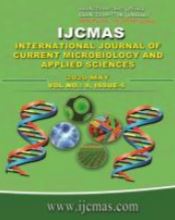


 National Academy of Agricultural Sciences (NAAS)
National Academy of Agricultural Sciences (NAAS)

|
PRINT ISSN : 2319-7692
Online ISSN : 2319-7706 Issues : 12 per year Publisher : Excellent Publishers Email : editorijcmas@gmail.com / submit@ijcmas.com Editor-in-chief: Dr.M.Prakash Index Copernicus ICV 2018: 95.39 NAAS RATING 2020: 5.38 |
The present investigation was aimed to evaluate yield stability, environment suitability and identification of environment specific wheat genotypes using AMMI and GGE biplot analysis. Eight wheat genotypes (G1–G8) with diverse genetic background were sown on three dates (Timely- November), (Late–December) and (Very Late-January) under drought (E1, E2, E3) and irrigated conditions (E4, E5, E6) during the Rabi seasons 2015-16 and 2016-17 in RBD with three replications at experimental farm of Wheat Section, Department of Genetics and Plant Breeding, CCS Haryana Agricultural University. Pooled analysis of variance (ANOVA) based on yield data was conducted to determine the effects of genotype (G), environment (E) and their interactions. The performance of wheat genotypes was assessed using stability models (1) Additive Main effects and Multiplicative Interaction (AMMI) and (2) GGE Biplot or Site Regression model. The maximum yield was observed under E4 (525.70g/m2) followed by E5(403.97 g/m2), E6 (341.74 g/m2), E2 (208.10 g/m2), E1 (207.63 g/m2) and E3 (169.36 g/m2). Among the genotypes WH 1105 (393.75 g/m2) recorded highest grain yield followed by HD 2967 (386.93 g/m2), DHTW 60 (380.55 g/m2), HTW-11 (294.43 g/m2), Kundan (276.60 g/m2), C-306 (261.55 g/m2), WH 730 (258.57 g/m2) and AKAW 3717 (222.93 g/m2). The results showed G5 (HTW-11), G8 (WH- 1105) and G7 (WH-730) were observed to be the best adapted genotypes for E5, E3 and E2, respectively. GGE biplot analysis revealed that G4 (HD 2967) was high yielding and stable genotype for all the environments and could be recommended for its cultivation across the different environments.
 |
 |
 |
 |
 |